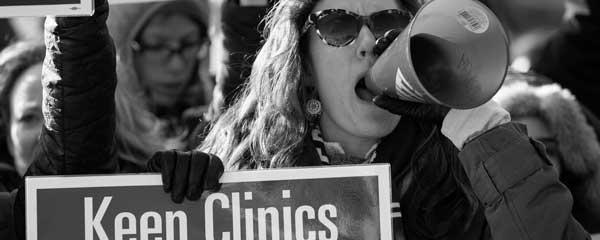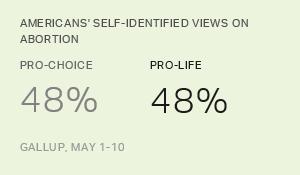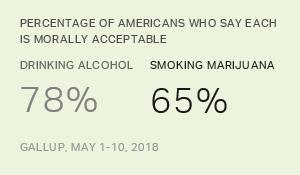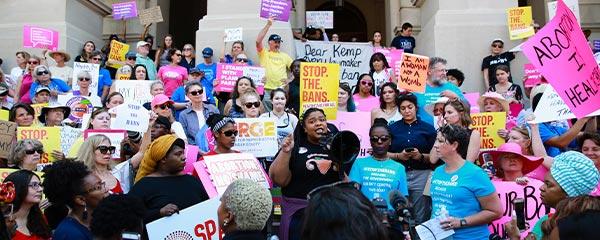This story is part of a special series on Americans' attitudes toward abortion in 2018.
In 1962, when a pregnant Arizona woman discovered that a sleeping pill she had been taking contained thalidomide, a drug known in the U.S. to cause birth defects, she tried unsuccessfully to obtain a legal abortion in the U.S. Ultimately, she chose to travel to Sweden, where she had an abortion. An August 1962 Â鶹´«Ã½AV poll -- the first poll dealing with abortion in Â鶹´«Ã½AV's history -- showed that her decision was supported by 52% of Americans who said it was the right thing to do, but 32% thought it was the wrong decision.
Sherri Finkbine, the woman at the center of this highly publicized, controversial case, was a mother of four and the host of an Arizona children's television show when she took the pills her husband had obtained while traveling in Europe. Once she realized that the medication was potentially harmful to her unborn baby, she attempted to have an abortion locally. But abortion was illegal in the U.S. with the exception of limited circumstances in which the mother's life was in danger.
One Arizona hospital's decision to perform the procedure was reversed. After Finkbine was publicly identified as the woman at the center of the case, a media firestorm ensued and the case gained global attention. The Finkbine family was bombarded with hate mail and death threats, which led to FBI protection for their children. Public debate was sharply divided, with Catholics particularly outspoken against her pursuit of abortion. The Catholic Church was vocal in condemning her actions, and on the day that she received the abortion in Sweden, Radio Vatican called it "a crime." In September 1962, shortly after Finkbine's abortion, George Â鶹´«Ã½AV wrote that although "a significant minority" (33%) of U.S. Catholics supported her decision, "the weight of sentiment" (49%) thought it was the wrong thing for her to have done.
Men's and women's views did not differ much from each other, but men were slightly more likely than women to say Finkbine did the right thing, 54% to 50%, respectively.
| Right thing | Wrong thing | No opinion | ||||||||||||||||||||||||||||||||||||||||||||||||||||||||||||||||||||||||||||||||||||||||||||||||||
|---|---|---|---|---|---|---|---|---|---|---|---|---|---|---|---|---|---|---|---|---|---|---|---|---|---|---|---|---|---|---|---|---|---|---|---|---|---|---|---|---|---|---|---|---|---|---|---|---|---|---|---|---|---|---|---|---|---|---|---|---|---|---|---|---|---|---|---|---|---|---|---|---|---|---|---|---|---|---|---|---|---|---|---|---|---|---|---|---|---|---|---|---|---|---|---|---|---|---|---|---|
| % | % | % | ||||||||||||||||||||||||||||||||||||||||||||||||||||||||||||||||||||||||||||||||||||||||||||||||||
| All adults | 52 | 32 | 16 | |||||||||||||||||||||||||||||||||||||||||||||||||||||||||||||||||||||||||||||||||||||||||||||||||
| Gender | ||||||||||||||||||||||||||||||||||||||||||||||||||||||||||||||||||||||||||||||||||||||||||||||||||||
| Men | 54 | 30 | 16 | |||||||||||||||||||||||||||||||||||||||||||||||||||||||||||||||||||||||||||||||||||||||||||||||||
| Women | 50 | 33 | 17 | |||||||||||||||||||||||||||||||||||||||||||||||||||||||||||||||||||||||||||||||||||||||||||||||||
| Religion | ||||||||||||||||||||||||||||||||||||||||||||||||||||||||||||||||||||||||||||||||||||||||||||||||||||
| Catholics | 33 | 49 | 18 | |||||||||||||||||||||||||||||||||||||||||||||||||||||||||||||||||||||||||||||||||||||||||||||||||
| Protestants | 56 | 27 | 17 | |||||||||||||||||||||||||||||||||||||||||||||||||||||||||||||||||||||||||||||||||||||||||||||||||
| Â鶹´«Ã½AV, Aug. 23-28, 1962 | ||||||||||||||||||||||||||||||||||||||||||||||||||||||||||||||||||||||||||||||||||||||||||||||||||||
In the end, the Finkbines were told by the doctor who performed the abortion that the three-month-old fetus had no legs and only one arm. Mrs. Finkbine lost her job as a result of her decision to seek an abortion. But her case is often cited as one of the key moments in the evolution of the public's perceptions of abortion that led to the 1973 Roe v. Wade Supreme Court ruling that established a woman's legal right to abortion in the U.S.
Read more about Â鶹´«Ã½AV polling on Abortion.
View the original 1962 Â鶹´«Ã½AV news release on reaction to traveling abroad for an abortion.
Read more from the Â鶹´«Ã½AV Vault.





